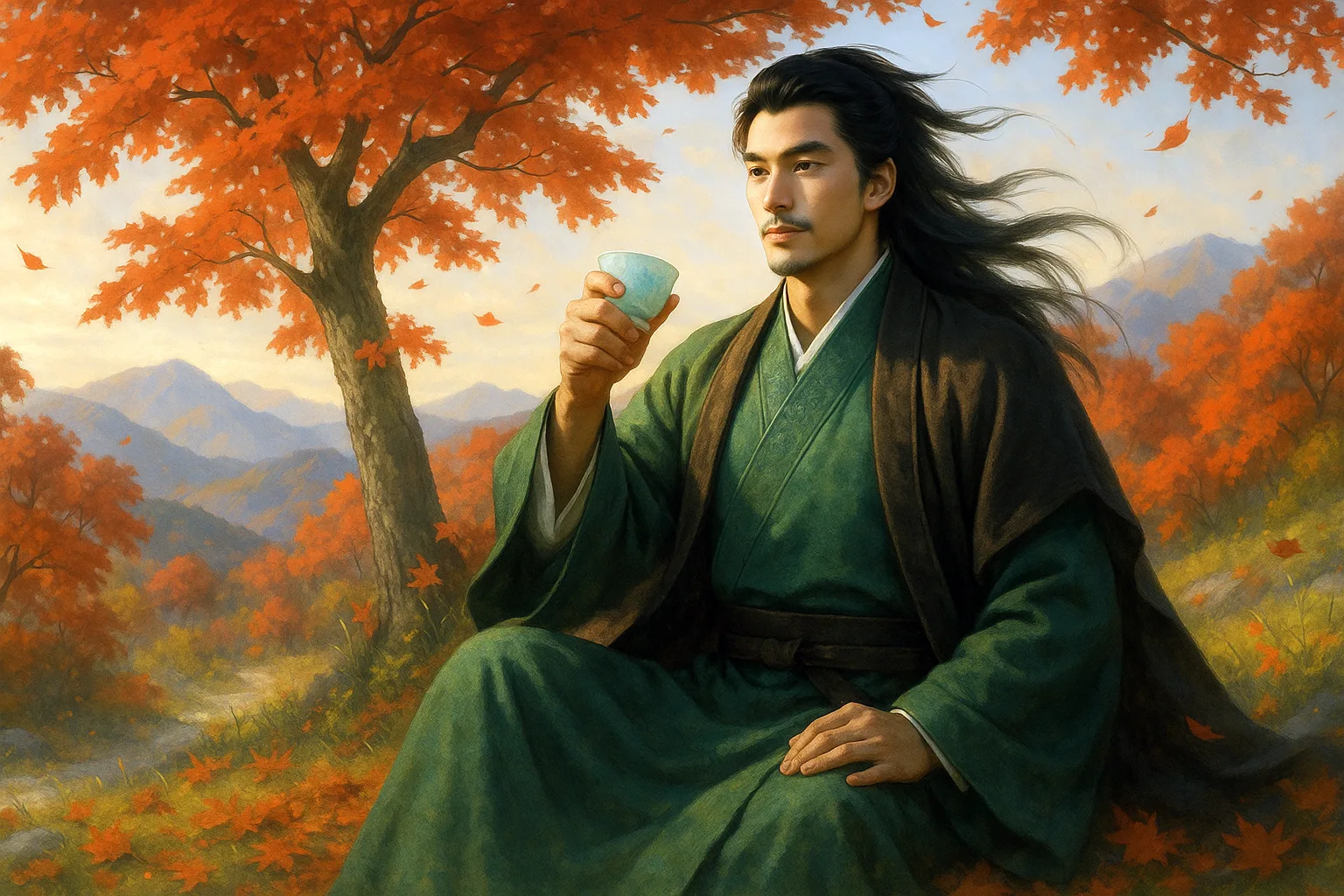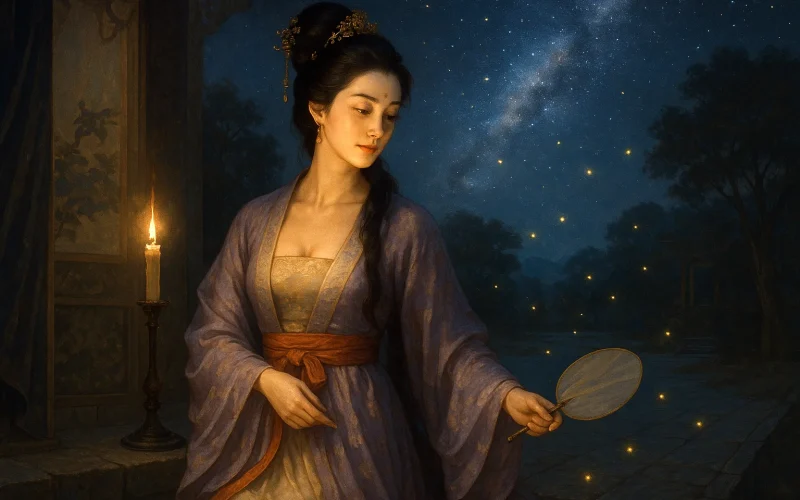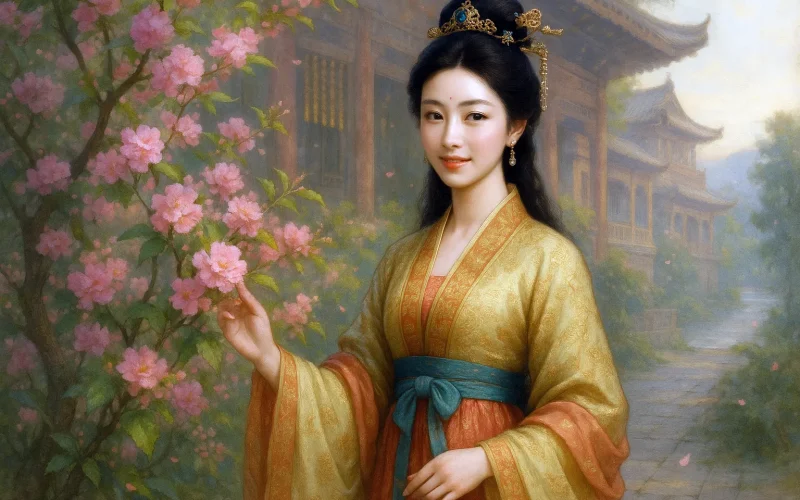Her candle-light is silvery on her chill bright screen.
Her little silk fan is for fireflies....
She lies watching her staircase cold in the moon,
And two stars parted by the River of Heaven.
Original Poem
「秋夕」
杜牧
银烛秋光冷画屏,轻罗小扇扑流萤。
天阶夜色凉如水,坐看牵牛织女星。
Interpretation
"In the Autumn Night" was written by Du Mu during the Tang Dynasty. The poem focuses on the life of a palace maid, using the scenery to subtly reveal her loneliness and helplessness. In the strict hierarchical system of the Tang court, many palace maids, once out of favor, were confined to the deep palace for life, living in isolation and despair. Through this poem, Du Mu portrays the maid's state of mind as she gazes at the stars on a cold autumn night, lost in thought.
First Couplet: "银烛秋光冷画屏,轻罗小扇扑流萤。"
Yín zhú qiū guāng lěng huà píng, qīng luó xiǎo shàn pū liú yíng.
The silver candle's light falls coldly on the painted screen; with a light silk fan, she chases the flitting fireflies.
This couplet sets the scene with a cold and lonely atmosphere. The "silver candle" (银烛) and "painted screen" (画屏) should evoke warmth and beauty, but the word "cold" (冷) underscores the maid's inner loneliness. The act of chasing fireflies with a "light silk fan" (轻罗小扇) seems trivial, but it carries deep symbolic meaning. Fireflies, often found in desolate places, have entered the palace, symbolizing the maid's isolation. The fan, typically used in summer, is now useless in autumn, representing the maid's abandonment, much like a discarded fan.
Second Couplet: "天阶夜色凉如水,坐看牵牛织女星。"
Tiān jiē yè sè liáng rú shuǐ, zuò kàn Qiānniú Zhīnǚ xīng.
The night on the palace steps is as cool as water; she sits and gazes at the stars of the Cowherd and the Weaver Girl.
This couplet deepens the portrayal of the maid's loneliness. The "cool as water" (凉如水) night envelops her as she sits on the steps, lost in thought. Gazing at the stars of the Cowherd and the Weaver Girl, she reflects on their tragic love story—a pair separated by the Milky Way, allowed to meet only once a year on the seventh day of the seventh month. This celestial imagery symbolizes her own longing for love and companionship, as well as her resignation to her fate.
Overall Appreciation
This poem delicately captures the loneliness and longing of a palace maid through vivid imagery and subtle symbolism.
The first couplet uses the cold light of the silver candle and the painted screen to create a sense of isolation. The maid's act of chasing fireflies with a fan, though seemingly mundane, symbolizes her futile attempts to find meaning and connection in her confined life.
The second couplet shifts to a more introspective tone, as the maid gazes at the stars of the Cowherd and the Weaver Girl. This celestial imagery not only reflects her longing for love but also highlights the cruel reality of her isolation. The cool night and the distant stars create a poignant contrast between her inner desires and her external circumstances.
The poem's strength lies in its ability to convey deep emotion through simple yet evocative imagery. Du Mu's use of symbolism and his subtle portrayal of the maid's inner world make this poem a powerful meditation on loneliness, longing, and the human desire for connection.
Writing Characteristics
- Symbolism and Imagery
The poem uses symbols like the fireflies, the silk fan, and the stars of the Cowherd and the Weaver Girl to convey the maid's loneliness and longing. - Atmosphere and Mood
The cold, quiet atmosphere of the palace at night mirrors the maid's inner desolation, creating a powerful emotional resonance. - Subtlety and Nuance
Du Mu's portrayal of the maid's emotions is understated yet deeply moving, allowing the reader to feel her loneliness and longing without explicit description.
Insights
This poem offers a poignant glimpse into the life of a palace maid, highlighting the loneliness and despair that often accompany a life of isolation. Du Mu's portrayal of the maid's longing for love and connection resonates with the universal human desire for warmth and companionship.
The poem also serves as a critique of the rigid social structures that confine individuals to lives of isolation and despair. The maid's plight is a reminder of the importance of empathy and the need to recognize the humanity of those who are often overlooked or forgotten.
Ultimately, "In the Autumn Night" is a meditation on loneliness, longing, and the enduring human spirit. It challenges us to reflect on our own lives and to seek out connections that bring meaning and joy, even in the face of adversity.
Poem translator
Kiang Kanghu
About the poet

Du Mu (杜牧), 803 - 853 AD, was a native of Xi'an, Shaanxi Province. Among the poets of the Late Tang Dynasty, he was one of those who had his own characteristics, and later people called Li Shangyin and Du Mu as "Little Li and Du". His poems are bright and colorful.












